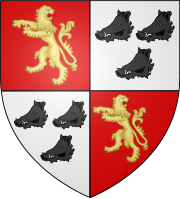Baron Cadogan of Reading
| Earldom of Cadogan | |
|---|---|
 
Quarterly: 1st and 4th gules, a lion rampant reguardant or (for Cadogan); 2nd and 3rd argent, three boar's heads couped sable.
|
|
| Creation date | 27 December 1800 |
| Creation | Second |
| Monarch | George III |
| Peerage | Peerage of Great Britain |
| First holder | Charles Cadogan, 3rd Baron Cadogan |
| Present holder | Charles Cadogan, 8th Earl Cadogan |
| Heir apparent | Edward Cadogan, Viscount Chelsea |
| Remainder to | Heirs male of the first earl's body lawfully begotten |
| Subsidiary titles | Viscount Chelsea |
| Former seat(s) | Culford Park |
| Armorial motto | Qui invidet minor est ("He who envies is the inferior") |
Earl Cadogan /kəˈdʌɡən/ is a title that has been created twice in the Peerage of Great Britain for the Cadogan family. The second creation, in 1800, was for Charles Cadogan, 3rd Baron Cadogan.
Of Welsh origin, the family name was spelled Cadwgan until the early 15th century. According to Burke's Peerage, the family descends from: Rees ap Griffith ap Llewelyn ap Meredith Bengoch ap Howell (Lord of Penbuallt) ap Sitsylt (Lord of Builth) ap Llewelyn (Lord of Builth) ap Cadwgan ap Elystan Glodrydd ("The Renowned"), Prince of Fferreg, of Dol-y-Gaer, Breconshire.
Major William Cadogan (1601–1661) , a cavalry officer in Oliver Cromwell's army. His son Henry Cadogan was a barrister in Dublin. His eldest son William Cadogan was a noted soldier, politician and diplomat. He was a general in the army and fought in the War of the Spanish Succession and also served as Ambassador to the Netherlands and as Master-General of the Ordnance. In 1716, he was raised to the Peerage of Great Britain as Baron Cadogan, of Reading in the County of Berkshire, with normal remainder to the heirs male of his body. In 1718, he was further honoured when he was made Baron Cadogan, of Oakley in the County of Buckingham, with remainder, failing heirs male of his own, to his younger brother Charles Cadogan and the heirs male of his body, and Viscount Caversham, in the County of Oxford, and Earl Cadogan, in the County of Denbigh, with remainder to the heirs male of his body. These titles were also in the Peerage of Great Britain.
...
Wikipedia
